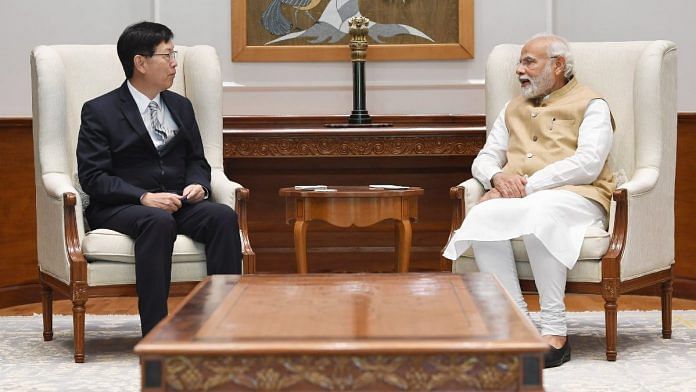China has been warning the US about grave consequences over House Speaker Nancy Pelosi’s Taiwan visit. Beijing made a number of intimidating moves and the People’s Liberation Army conducted live fire drills in the South China Sea, Yellow Sea and Bohai Hills. Undeterred, Pelosi carried on with her resoundingly successful visit. And so, the first round in the war of nerves goes to the US.
The White House has played down the visit, calling it a private affair and reiterating the US establishment’s commitment to ‘One China’ policy. But Beijing isn’t convinced. Why would the US station four warships close to East of Taiwan? The US says these are “normal, routine deployments”.
China has responded by reducing the import of fruits and fish from Taiwan and suspending the export of natural sand. It has also started its military operations against Taiwan. The island nation’s resolve to fight back is at its best, showcasing the conflict between hegemonic authoritarianism and democracy. It remains to be seen if the US would move its navy across the Taiwan Strait should the conflict escalate. Unlike Ukraine, the sea around Taiwan is not as inaccessible to the US navy and air force.
While India followed ‘One China’ policy, the Manmohan Singh government dropped its mention during then-Chinese premier’s visit in 2010. Then, in 2014, Narendra Modi invited Taiwanese ambassador Chung Kwang Tien and the President of the Central Tibetan Administration Lobsang Sangay for his swearing-in ceremony. Clearly, India has been moving away from the policy of coddling China. Now it is time for New Delhi to strengthen trade relations with Taiwan and scale up diplomatic relations.
Also read: As Taiwan pushes back against China reunification call, a look at the 350-year-old dispute
Who benefits from the crisis
Russia is keenly watching the US-China estrangement over Taiwan. Moscow does not seem to be ready to jump into the fray. The erstwhile USSR was not involved in any of the earlier China-Taiwan crisis, ideological fraternity notwithstanding. Moscow would want the Taiwan issue to escalate so that the immediate attention from Ukraine is diverted.
But it is unlikely that the US will leave Moscow alone to deal with Ukraine. A day before Nancy Pelosi was on her way to Taiwan, US special operations forces eliminated Al Qaeda chief Ayman al-Zawahiri in his safe house in Kabul, Afghanistan. Exhibiting traits of a superpower, the White House is capable of multitasking when it comes to handling global affairs. It would, therefore, be naïve to think that the US would get bogged down by just one country at a time.
As of now Beijing does not appear to be in a mood to escalate the crisis. China is known to act in a calibrated manner and strike at a time and place of its choice. But Xi Jinping is a man in a hurry because he has to guard his image of being a strong man and someone who does not succumb to the US’s bullying. The choice for him is between a third presidential term and an unceremonious exit from power. Besides, Beijing must tackle the tail-end battering of Covid pandemic and a rapidly nosediving economy. It is doubtful if Beijing can withstand economic sanctions at this stage.
Also read: To check China’s hostility, India, Taiwan and Japan need an intelligence-sharing alliance
The matter of economy
The post-pandemic economic revival witnessed an increased demand for electronic parts and equipment. A frontrunner in these areas of industry, Taiwan registered 64 percent of the global foundry market and semiconductor manufacturing and exports. Many of the electronic spare parts for the automobile industry and other related areas of manufacturing still depend heavily on the Taiwanese production facilities.
The Chinese consumer goods manufacturing industry depends on exports from Taiwan but Taiwan depends on heavy energy and consumer product imports, which should be a cause of worry. But the silver lining is that foreign exchange reserves of Taiwan is about 280 percent of its GDP, which is enough to sustain 13 months of imports. A prolonged conflict and “punishment” by China could put strain on the Taiwanese economy in the long run.
Economic uncertainty will help neither China nor Taiwan. Any extreme military action and forced annexation attempt will result in a Ukraine-like conflict, which will be highly detrimental to Taiwan but will also isolate China.
While some of the economies in South Asia and Southeast Asia are in a bad shape, India has been able to withstand the headwinds. New Delhi should try its best to be part of all attempts at scaling down the conflict situation without getting drawn into the vortex of the flashpoint.
Greater economic partnership with Taiwan should be followed up by encouraging the domestic manufacturing sector, removing all impediments, liberalising tax laws and strengthening the supply chain mechanism. Economic strength will be a key factor in determining leadership in the emerging world order.
The author is the former editor of ‘Organiser’. He tweets @seshadrichari. Views are personal.
(Edited by Prashant)



